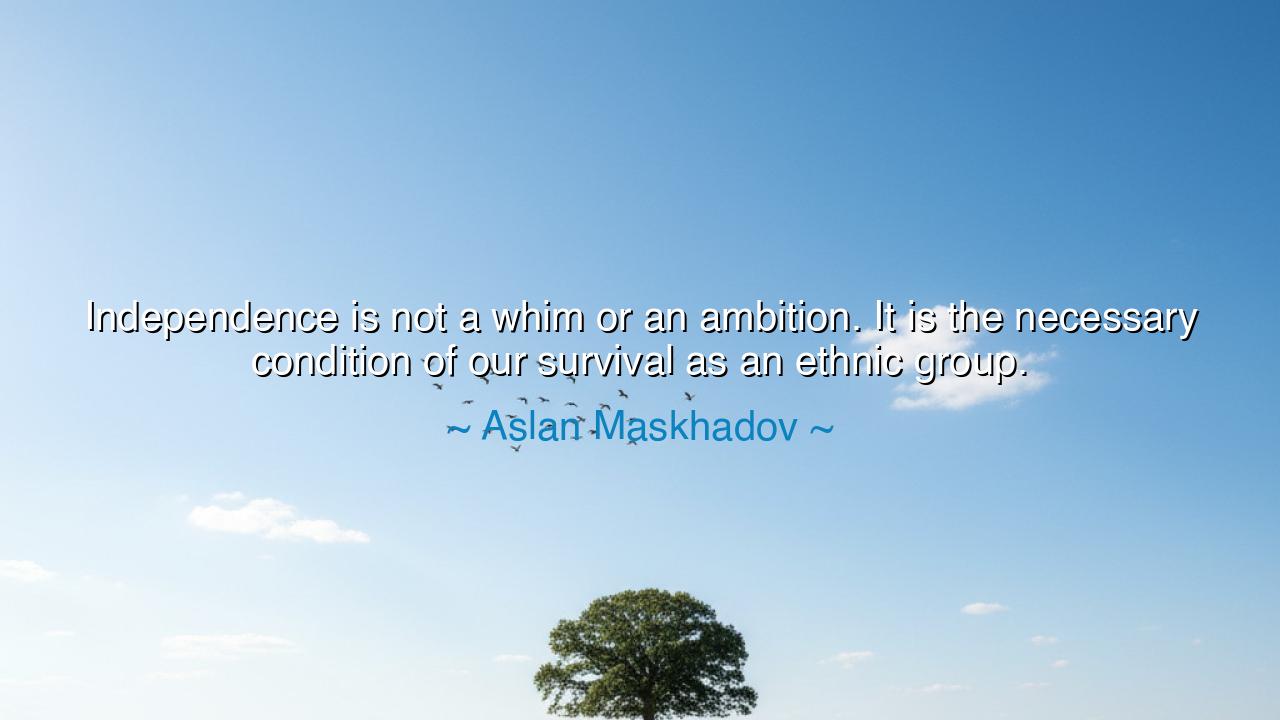
Independence is not a whim or an ambition. It is the necessary
Independence is not a whim or an ambition. It is the necessary condition of our survival as an ethnic group.






“Independence is not a whim or an ambition. It is the necessary condition of our survival as an ethnic group.” — Aslan Maskhadov
These words, spoken by Aslan Maskhadov, burn with the fire of a people’s struggle and the sorrow of a long resistance. They are not the boast of pride, nor the cry of vanity — they are the solemn truth of a man who spoke for a nation standing on the edge of extinction. In them lives the ancient rhythm of all oppressed peoples, who through history have cried not for conquest, but for the right to exist. Maskhadov’s voice, forged in the fires of Chechnya’s wars, declares that independence is not a luxury, not an indulgence of restless hearts, but the lifeblood of identity. To be independent, he says, is not to seek glory, but to secure survival — for a nation without self-determination is like a tree severed from its roots, withering even as it still stands.
The meaning of this quote reaches far beyond one people’s cause. Maskhadov reminds us that the yearning for freedom is not born from arrogance, but from necessity. When the spirit of a people is denied the right to govern itself — its language silenced, its culture erased, its traditions scorned — then to seek independence is not rebellion, but self-preservation. It is the sacred act of remembering who one is when the world insists that one must forget. Independence, in this sense, is the shield against oblivion. It is the defiance of a people who refuse to vanish quietly into history’s margins.
To understand the origin of these words, we must remember the soil from which they sprang. Aslan Maskhadov, the president of the Chechen Republic of Ichkeria, led his people through a brutal conflict with Russia in the 1990s. The Chechens had suffered conquest, deportation, and near annihilation — their families scattered, their villages burned, their faith and culture suppressed. Yet even amid the rubble, the cry for freedom did not die. For them, independence was not a political game — it was the breath in their lungs, the song in their blood. Maskhadov’s words were not uttered in the comfort of a palace, but in the shadow of war, where each day’s survival was itself an act of defiance.
History echoes with many who have spoken the same truth in their own tongues. Think of Mahatma Gandhi, who said that India’s independence was not for glory, but so her people could reclaim their dignity — to spin their own cloth, speak their own languages, and walk upon their own soil without shame. Think of the Kurds, whose stateless struggle for survival across centuries mirrors the Chechen plight, their culture held together by memory when borders denied their existence. And think of the Native peoples of the Americas, who still fight to preserve their ways amid the tide of forgetting. In each of these, the lesson is the same: when the world’s great powers see independence as an inconvenience, the oppressed know it as life itself.
Maskhadov’s words also carry a warning — that dependence breeds decay, not only of politics, but of spirit. When a people surrenders their right to choose, they soon surrender the strength to exist. A culture that relies on others for permission to breathe will one day forget how to draw breath at all. Thus, independence is not only a shield for nations but for souls. Every man and woman must seek within themselves the same truth — to be free not by whim, but by necessity; to live not by the mercy of others, but by the command of their own conscience.
Let this teaching, then, be passed down to future generations: freedom is not granted — it is guarded. It must be earned not once, but always. Independence is not the end of struggle, but the beginning of responsibility — the duty to protect one’s culture, to educate one’s children, to honor one’s ancestors, and to defend one’s home. For when a people forget why they sought independence, they begin to lose it again in spirit long before they lose it in law.
And so, remember this: whether as nations or as individuals, we are not made to live as echoes of another’s voice. We are born to speak in our own language, to stand upon our own ground, to carry the stories that no empire can erase. Independence is not an ambition — it is the breath of survival, the rhythm of the heart, the sacred right to be. Guard it as you would guard your life, for it is your life. And when the world asks why you strive, answer as Maskhadov did — not for conquest, not for pride, but because without freedom, there can be no tomorrow.






AAdministratorAdministrator
Welcome, honored guests. Please leave a comment, we will respond soon